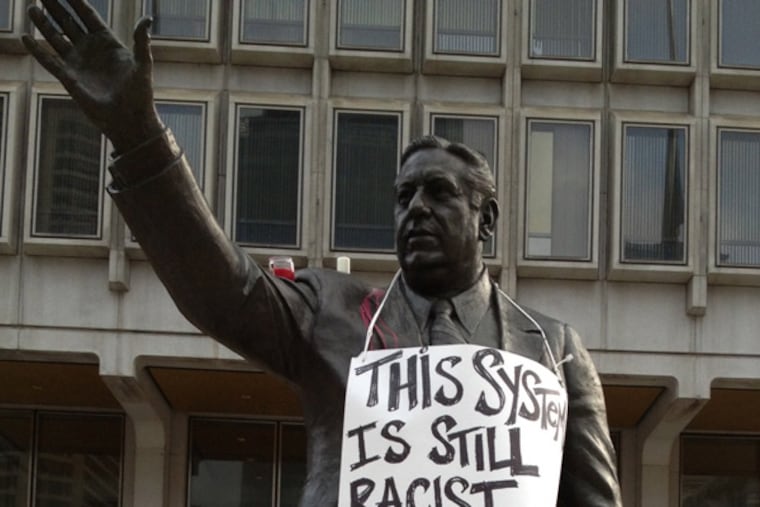Debate rages over verdict in Martin case
Debate swirled Sunday over the not-guilty verdict in the Trayvon Martin case, as public officials and private citizens focused on racial profiling, self-defense, and equal justice.

Debate swirled Sunday over the not-guilty verdict in the Trayvon Martin case, as public officials and private citizens focused on racial profiling, self-defense, and equal justice.
Mayor Nutter, who last year called the shooting "an assassination," was among those who expressed disappointment in George Zimmerman's acquittal in the shooting death of Martin, 17.
"A young black man is dead without any real explanation," Nutter said in a statement. "George Zimmerman took an innocent life. Trayvon Martin, who at trial was made to appear threatening when all he had was a bag of Skittles and an iced tea, should not have died at Zimmerman's hands, and I believe the jury should have exacted a penalty."
From government offices and church pulpits, to public plazas and river walks, people - many with strong emotions - weighed in on the jury verdict that was issued Saturday night.
Outside the Municipal Services Building, the statue of former Mayor Frank Rizzo, who had a poor relationship with Philadelphia's African American community, was a focal point Sunday for a vigil for Martin.
"This system is still racist," read a poster that was hung around the statue's neck.
Passers-by took pictures of the demonstration area and voiced their opinions.
"A young black kid was killed because he was black," said Aine Ni Shoinnaigh, 35, an Ireland native who immigrated to the United States five years ago. "If Trayvon had been a young white kid in that suburb smoking a crack pipe, he probably would have been allowed to go home."
Zimmerman's mother is Hispanic, and his father is white.
"That man [Zimmerman] is going to have to live with that. He killed a child," said the Rev. Patricia Thomas, 61, associate pastor of Spirit and Truth Worship Cathedral in Strawberry Mansion. "He got off legally, but morally he did not get away. We have a legal system that's broken."
"It does seem like there's an underlying race issue," said Abby Blackmore, 28, a native of New Zealand who was visiting Philadelphia. "It doesn't matter who killed who. [How people judge one another] should be color-blind."
In Philadelphia, as in many cities throughout the nation Sunday, protests over the verdict remained largely peaceful, despite highly charged emotions. In some places, demonstrators burned American flags as President Obama - and the Martin family - urged nonviolence.
George Parry, a former federal and state prosecutor who practices law in Philadelphia, reviewed the case and said "Zimmerman should have never been charged in the first place."
"Thanks to Zimmerman's tenacious lawyers, the prosecution was forced to release the evidence that established self-defense," Parry said. "It's not that they botched the case. They brought a case they should have never brought."
From the White House, Obama referred to Martin's death as a "tragedy" and called for "calm reflection."
"We should ask ourselves, as individuals and as a society, how we can prevent future tragedies like this," the president said. "As citizens, that's a job for all of us. That's the way to honor Trayvon Martin."
At Mount Olivet Tabernacle Baptist Church in West Philadelphia, the sermon Sunday addressed the verdict indirectly, focusing on how God would want the congregation to react, and on the larger social ills that underlie the killing and its aftermath.
"There's a lot of consternation," said Pastor Tokunbo Adelekan. "People are deeply disappointed. Profoundly upset. . . . But also not surprised at the way things have gone."
"Racism is in the air that we breathe," Adelekan said after the service. He hoped his members came away with "a sense of reassurance and hope," instead of "a sense of retributive justice."
The jurors' work was summed up in two words by Isaiah Elum, 21 and black, of Northeast Philadelphia, who was on a walk near the Art Museum Sunday: "No justice."
"I believe something should've happened," said Elum, whose thoughts then went to Martin's parents. "At the end of the day, they lost a son. He's not here to tell his story."
The protests carried into the evening, when about 500 people gathered at LOVE Park before marching around City Hall and down Market Street toward Independence Mall shouting, "Boycott Florida!" and "No justice, no peace!"
"I don't even like guns, but what it says is I better buy one," Michael Wilson, 55, of Philadelphia Action Network, said of the verdict. "You better get a gun and be prepared to use it, because the police won't protect you."
Jeff Rousset, 27, a national organizer for Prometheus Radio Project, said the verdict "continues a long legacy of white supremacy in the United States, and it continues to demonstrate the U.S. prison system is built on the bones of slavery to kill and incarcerate black and brown bodies, and never to protect them."
Nearby, Mary Parlee, 27, visiting from Boston, thought she knew how the verdict should go - until she watched the trial.
"My initial thought was that George Zimmerman should have been locked behind bars for the rest of his life," Parlee said. She said she followed the case closely, and "felt completely different after hearing the defense's arguments."
"I'm not sure he should have gotten off completely, but I can see why they came to that verdict," Parlee said.
Nutter's expression of disappointment over the verdict came with a call for constructive action:
"We need to resolve to make life better in America for all our children, regardless of skin color. Let us focus our anger and resolve to work toward a more just, safer and more caring America."